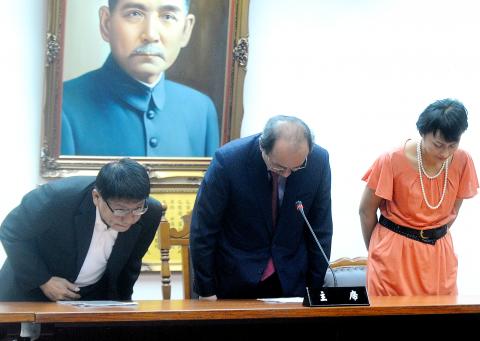|
Ma apologizes over
amendment flap
ACCOUNTING ERROR: President Ma Ying-jeou said
neither the government nor the KMT had thoroughly thought through an amendment
to the Accounting Act
By Mo Yan-chih and Shih Hsiu-chuan / Staff reporters

President Ma Ying-jeou bows in
apology yesterday over what he called a flawed amendment to the Accounting Act
passed by the legislature on Friday last week as Premier Jiang Yi-huah looks on.
Photo: George Tsorng, Taipei Times

Democratic Progressive Party (DPP)
caucus convener Ker Chien-ming, center, and caucus whips Pan Men-an, left, and
Chiu Yi-ying bow and apologize yesterday over a much-disputed amendment to the
Accounting Act that was passed by the legislature last Friday.
Photo: Wang Yi-sung, Taipei Times
President Ma Ying-jeou (馬英九) yesterday
apologized for an amendment to the Accounting Act (會計法) that was hastily passed
by the legislature on Friday last week, and instructed the Executive Yuan to
issue a reconsideration order for the legislature to correct the amendment.
The lawmakers’ handling of the amendment had caused a negative impression and
damaged his administration’s reputation, Ma said.
As the president and the chairman of the Chinese Nationalist Party (KMT), Ma
pledged to take responsibility for the amendment and said the Executive Yuan and
the KMT caucus would make the necessary changes to meet public expectations.
“The government and the KMT did not think thoroughly through the amendment
process, including elected officials’ misuse of special allowances and the
missing word in the content. The Cabinet, the KMT caucus and I should reflect
deeply,” he told a press conference at the Presidential Office.
The amendment, passed at the last minute in closed-door cross-party negotiations
on Friday last week before the legislature went into recess, was supposed to
exempt research grants given by the government to professors and elected
officials’ special allowances from being audited.
However, the word “teaching [faculty]” was missing from the amended act’s
Article 99-1, which means professors could still face prosecution.
The amendment sparked disputes and criticism that it was aimed at benefiting
convicted officials, including former Non-Partisan Solidarity Union legislator
Yen Ching-piao (顏清標), who has been in jail since Feb. 19 after he was sentenced
to three-and-a-half years in prison for using nearly NT$20 million (US$668,500)
in taxpayers’ money to visit hostess bars when he was Taichung County Council
speaker.
Democratic Progressive Party (DPP) Chairman Su Tseng-chang (蘇貞昌) apologized on
Thursday over the party’s involvement in the amendment’s passage.
He also met Premier Jiang Yi-huah (江宜樺) and called on the Cabinet to issue a
reconsideration order for the amendment, but Jiang insisted that it was up to
the Legislative Yuan to resolve the problem, and the Cabinet would not veto the
bill.
However, the government made a U-turn after Ma met yesterday morning with Jiang,
Vice President Wu Den-yih (吳敦義) and Legislative Speaker Wang Jin-pyng (王金平) to
discuss the issue.
Ma said the Executive Yuan would exercise its reconsideration rights because the
amendment should apply to both elected officials and academics, or it would
create inequality.
It will be the first time the administration has issued a reconsideration order
since Ma took office in 2008.
Jiang said yesterday that an extra Cabinet meeting has been scheduled for 9am on
Monday to approve a proposal asking the legislature to make the change, under
the right enshrined in paragraph 3 of Article 57 of the Constitution.
The Executive Yuan would request that the legislature reconsider the amendment
because it has deemed the bill “difficult to execute,” Jiang said.
Once the Cabinet approves the proposal, it will be sent to the Presidential
Office for Ma’s endorsement and then to the Legislative Yuan.
If lawmakers vote in favor of the request, the amendment would be nullified.
According to Article 35 of the Act Governing the Legislative Yuan’s Power
(立法院職權行使法), the legislature, currently in recess, is required to call a
provisional session within seven days of receiving a request for reconsideration
and make a decision on the request within the next 15 days.
When asked by reporters why he changed his stance, Jiang did not give many
details.
The Executive Yuan has been closely following the reaction of various sectors of
society to the amendment and found that it did contain parts that are
“inappropriate” which would make its implementation difficult, he said.
The premier said the amendment was too “harsh” on academics and researchers and
too “lenient” on elected officials.
The amendment, under which elected officials involved in misuse of public funds
would not be prosecuted regardless of how the funds were spent, while academics
and researchers involved in irregularities in reimbursement for grants would not
be prosecuted if funds were spent on research-related purposes and not for
private purposes, “was inconsistent with the principle of fairness,” Jiang said.
In the week since the amendment was passed, the Executive Yuan had insisted that
the premier would countersign it, which is required for the president to
promulgate the bill, as stipulated in Article 37 of the Constitution.
However, Executive Yuan spokesperson Cheng Li-wun (鄭麗文) yesterday said Jiang
would be failing public expectations if he countersigned the amendment
considering “the high degree of concern the public has shown” over the issue.
KMT caucus whip Lai Shyh-bao (賴士葆) said the caucus would firmly support the
Executive Yuan.
Su said the DPP backed having the legislature reconsider the amendment.
“Our position is very clear — the flawed amendment passed by the legislature has
to be remedied. Using public funds on private matters cannot be decriminalized,”
Su told a press conference yesterday morning.
The DPP appreciates Ma response to the public’s concerns over the legislation,
Su said.
Meanwhile, DPP caucus whips Ker Chien-ming (柯建銘), Pan Men-an (潘孟安) and Chiu Yi-ying
(邱議瑩) also publicly apologized for the caucus’ handling of the amendment, bowing
as they did so.
Ker said the caucus hoped Wang would hold interparty negotiations on the issue
as soon as possible and hold a provisional session on Monday to resolve the
problem.
Additional reporting by Rich Chang
|
![]()
![]()
![]()